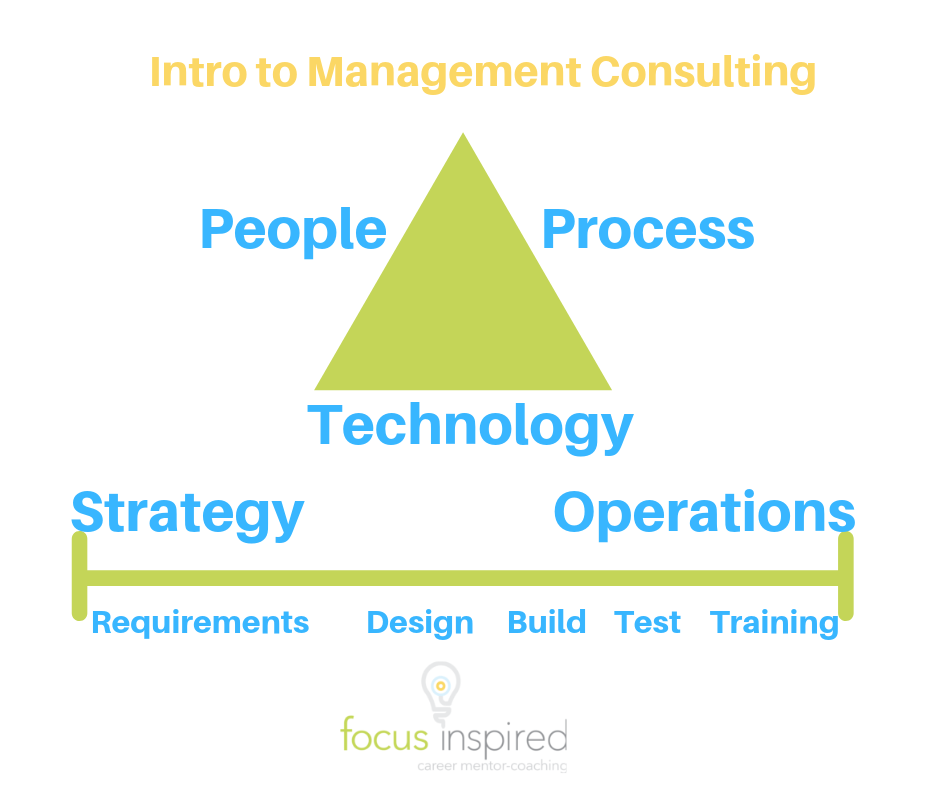
My intro to consulting
When people are informed that I used to run the undergrad campus recruiting program for a service area of a consulting firm, there are often requests to learn more about consulting and how to get into consulting. I thought I’d write a post to help people with that journey.
What is (management) consulting
From the Merriam-Webster dictionary
con· sult· ing | \ kən-ˈsəl-tiŋ \
1 : providing professional or expert advice
2 : of or relating to consultation or a consultant
Consulting is providing expertise as a service. The title consultant (who provides this advice) is often applied broadly. I hear various titles using the term consultant from a beverage consultant working at a coffee shop to a sandwich consultant working at a fast food place to a travel consultant working at an agency. The consulting I’ll be referring to in this post is management consulting. Management consulting provides advisory and implementation services for companies.
What does a (management) consultant do?
Strategy
A consultant can do many different things across a spectrum of strategy to operations. They may focus on a single part of it or they may go end-to-end. On the strategy side, a consultant may provide advisory on the direction of a company. Taking a look at where they should focus their attention in the coming 5, 10 or longer years. New products, new services or changes to existing ones. They may take a look at some of their business processes and determine where improvements might be necessary in order to stay competitive in their industry.
Implementation
That strategy turns into a project or some sort of implementation. A consultant can then turn that strategy into requirements for what exactly does the company need to do. And what the company needs to do often touches one of three parts of a triangle: people, process, technology.
The parts of the business triangle:
- People: there are basically no companies that exist now that do not have at least one employee. Even though the corporation itself is not a person, there are people working at the company in order to do whatever the company does.
- Process: these are all of the business activities that the company does. Whether it be manufacturing and supply chain logistics in order to get products from one place to another. Or providing of services. Or some other finance or administrative function on the backend. These are all of the different activities that people in the company do.
- Technology: there are pretty much no companies now that do not operate with some sort of technology. That might be software or machinery. And might not be at the core of the business, and might just support the business in its day-to-day operations.
From strategy to operations
The consultant will work with a company to determine which parts of their business they need to change. Will it be focussed on the people, process or technology? A consulting engagement may focus on one but I think the other two in some shape or form, and inevitably touch all 3 in some shape or form. If you change the people or how they work, then the business or technology needs to change. If you change the process, then the people need to be trained and the underlying technology needs to be adjusted. Or if you change the technology, then the people need to be trained to use it and the business needs to be adjusted to use the new technology. The consultant needs to agree with the company on what is required.
Once the consultant has requirements of what needs to be done, they often turn into more detailed requirements. From what the organizational structure will be (along with the roles and responsibilities of the people). To the individual steps that those employees (or customers) may need to follow in order to achieve their business goals. Or what the technology will need to do (all the way to what happens when certain buttons are pressed).
The client validates and approves the design, then the team goes and builds the solution. That team could be all from the consulting company or from the company or a hybrid mix. What the company and consulting firm will be building, might be training documents and work procedures for people. Or process documents on how the business will work. Or coding and configuration of technology. There will inevitably be a period of testing to make sure that all of these pieces fit together.
Operations
Then once that is done the company moves into operational mode and start training their people to use the new process. Then execute all the various transactions.
All of these steps are generalized and can follow whatever project management methodology that the company or consulting company uses. From “waterfall” (doing things sequentially) to agile (breaking the project up into smaller pieces to test, mitigate risk and see value sooner).
The players
The Big 3
The most notable management consulting companies are the Big 3 (or MBB) which are McKinsey, Bain, BCG. These companies tend to be solely focussed on strategy and Do some higher level and strategic forms of implementation. They tend to work with the CEO of the largest companies.
The Big 4
On the next tier are the Big Four (Deloitte, PwC, KPMG, EY), and our reference based on their status as the 4 largest accounting firms that also provide other professional services (including management consulting). They tend to provide a full range of services all the way from strategy to operationalization and 10 to work with the CEOs of medium-large size corporations or the CXO’s of larger corporations (X could be replaced by F=finance, T=technology, HR=human resources, or other functions).
Boutique and other consulting firms
Then there are different ways to segment the next tier which include various technology consulting players that are all moving upstream to provide more strategy (Accenture and IBM). As well as many other boutique companies that may focus on a particular functional area, industry, or some other niche.
Summary
So that’s a brief intro to management consulting. They basically provide their expert advice across a business’ people, process and/or technology. They may focus on strategy or go all the way to the implementation (and everything in between).
Although the information is a gross oversimplification, it should give you some good starting of knowledge of management consulting!
Follow:
Share:
